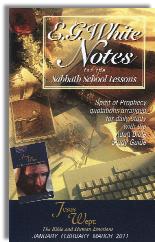|
||||||||||||||
Commentary on "Self-Esteem"
Day 6: Thursday, February 24, 2011 - A New Self
Overview
“The adverse behaviors mentioned in Ephesians 4, such as lying, anger, and bitterness, leave the person with a diminished sense of value. In contrast, sharing with those in need and being kind and compassionate are actions that can enhance self-esteem, as they change a person’s focus from self and thus leave the person with a sense of accomplishment.” (Teacher’s Quarterly, Page 110)
Problems
Here is the explicit focus on behavior modification that I mentioned at the beginning of this analysis.
According to psychological reasoning, if I treat you poorly, your and my self-esteem will suffer. If I treat you well, our self-esteem will improve.
According to the Bible, when I am lost (spiritually dead), all my behaviors are motivated by selfishness. I treat you poorly or well only in accordance with what I think I can gain from the situation. Self-esteem turns out to be a mask that covers the black hole inside sucking the very life from a person. Some create a better mask than others, but all are desperate to hide the truth.
When I am saved (spiritually alive), all my behaviors can be motivated by the indwelling Holy Spirit as He renews my mind, will and emotions. I wrote “can be motivated” because even saved people wrestle with the flesh and its indwelling sin. But we now have a choice. We can walk by faith in the Spirit, allowing agape love to overflow to others, or we can walk in the flesh, behaving like lost people (see Galatians 5).
For saved people, self-esteem derives from our identity as children of God and nothing else. Our motivation in relationships is not to enable lost people to create better masks but to point them to Jesus; the One Who can replace their soulish black holes with Himself.
This is not a semantic argument. It is the practical difference between accepting a Biblical definition of sin and salvation, and everything that accrues because of them, and accepting human definitions. It is the difference between being “renewed in the spirit of your mind” (Ephesians 4:23) and walking “in the futility of their mind” (Ephesians 4:17).
Summary
- Ephesians 4 lays out the stark contrast between life in the flesh and life in the Spirit. The author properly identifies this contrast.
- But the author fails to identify behaviors as the result of an inner reality, choosing instead to suggest behavior modification, or working from the outside in, as the cause.
- No human being ever will succeed at truly building up another human being apart from the indwelling Holy Spirit (grace) teaching us how to say No to ungodliness and Yes to righteousness (see Titus 2:11-14).
Copyright 2011 BibleStudiesForAdventists.com. All rights reserved. Revised February 16, 2011. This website is published by Life Assurance Ministries, Glendale, Arizona, USA, the publisher of Proclamation! Magazine. Contact email: BibleStudiesForAdventists@gmail.com.
The Sabbath School Bible Study Guide and the corresponding E.G. White Notes are published by Pacific Press Publishing Association, which is owned and operated by the Seventh-day Adventist church. The current quarter's editions are pictured above.
Official Adventist Resources
Standard Edition Study Guide Week 9
Teacher's Edition Study Guide Week 9


